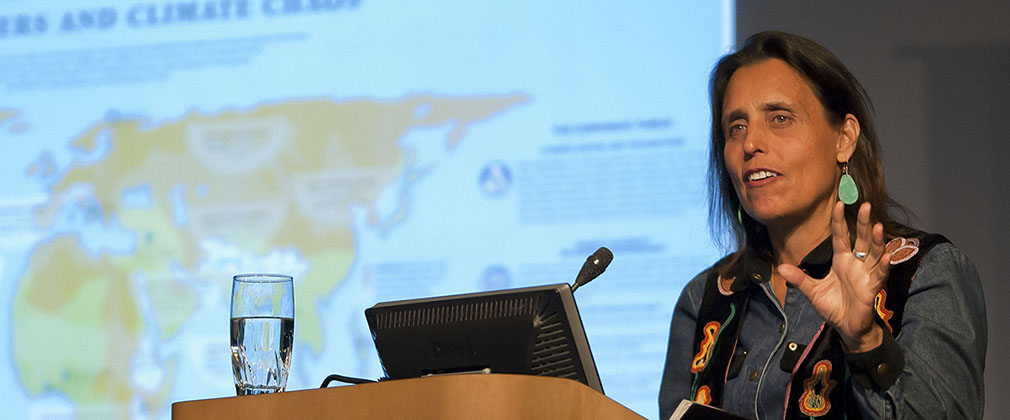A Winona LaDuke Reader
In a true sense of the words, Winona LaDuke is a force of nature.
An environmentalist, farmer, activist, writer, and advocate for native communities and ways of life, she is an Anishinaabe force to be reckoned with. As the Ms. Magazine Woman of the Year (1997), Ralph Nader’s vice presidential running mate on the 1996 and 2000 Green Party tickets, and recipient of the International Slow Food Award, her contributions have been widely recognized. But in January she was honored by an unlikely party—the Tucson United School District board, which became infamous for banning Mexican-American studies. Her response to the ban: “Recently, I had the distinction of becoming one of a select list of authors banned by the Tucson United School District. Now this is no small feat.” She went on to name the essay that had been specifically banned, and then wrote, “Interestingly enough, if I were going to ban one of my essays from a public school, this would probably not be the one.”
A few days ago, I was lucky enough to spend some time with Ms. LaDuke and ask which of her books is more ban-worthy. She was quick to tell me that The Militarization of Indian Country, which examines how the military has poisoned, murdered, and exterminated parts of indigenous populations, is probably her most threatening and radical work so far.
But for those of us who don’t have time to commit to a book right now, here are some insightful and tasty morsels from Ms. LaDuke, who spoke at the Johns Hopkins Bloomberg School of Public Health on Tuesday at Center for a Livable Future’s Annual Dodge Lecture and addressed topics ranging from agricultural biodiversity, academic responsibility, the cool squash she’s growing, and the redemptive, restorative properties of food, in all its forms, be they medicine, ancestors, or nourishment.
The Winona LaDuke Reader (Abridged)
On our oil-based food systems and cash economy, quoting her friend Jim Hightower: “If you’re digging a hole, at some point you might want to quit digging.”
On biodiversity: “Agrobiodiversity has great significance historically and in the future. … We should learn from history. You do not want monocrops [the cause of the Irish Potato Famine].”
On recovering seeds and rescuing them from patenting: “Our challenge is the seed map. We’re working on increasing the concentration of seed ownership [around the world].”
On the “really cool old squash,” Gete-okosomin, that she’s growing: “This is a perfect low-carbon food. And this is tough. It’s not a zucchini. This will be around.”
On climate change, or climate chaos, and peak oil: “The answer from Monsanto is to figure out how to genetically engineer more seeds for climate change and transport them around the world. That answer will not sustain us. The answer is the restoration of local food systems and biodiversity.”
On genetic engineering and the work done in universities, in the name of progress: “Over eight years, I’ve worked on stopping genetic engineering of our foods. It’s an issue of academic freedom versus academic responsibility. Just because you can do it doesn’t mean you should.”
On the Pacific prior to British colonization by Captain James Cook: “I call that B.C., Before Cook.”
On growing Pink Lady Flour Corn, a magenta-colored flour corn high in starch, as part of the White Earth Recovery Project: “It’s pretty. I’m the executive director, and I want pink corn.”
On food: “It’s more than nutrition; it’s a relationship. … Corn is a relative that has a relationship to us. It is also how one makes history.”
Again, on food: “Food is relatives. Those relatives might have wings or paws or fins or roots.
On the diabetes epidemic that is widespread on American Indian reservations, where about one third of citizens are diabetic: “I could spend my time lobbying for more dialysis clinics. Or I could do this [restore heritage plants and fight biopiracy]. It helps us become better people.”
On contemporary American culture: “We became people who shop, people who buy at Whole Foods. We have this feeling that we aren’t talented enough to farm or garden, we’re better at computers and such. I think part of our whole process has to be deconstructing that. I’m not a big fan of lawns. They’re pretty much a useless thing.”
On her father, and farming: “My father passed away about 20 years ago. He used to tell me, You’re a smart young woman, but I don’t want to hear your philosophy if you can’t grow corn. I did all sorts of fabulous things, ran for office, but I became a corn grower.”
On our appetite for artisanal foods: “You cannot sell a genetically engineered gourmet product.”
On the lab science-based development of hybrid plants: “I’m biased toward restoration of indigenous knowledge systems.”
Punning: “I’m a stalker. I’m hanging out with a bunch of corn guys.”
On world views: “The difference between American and many indigenous world views is that America is rights-based, and we [native peoples] are responsibility-based. That’s an important construct. We have our spiritual teachings. You pray when you harvest, pray when you’re planting … you have to be mindful and thoughtful.”
